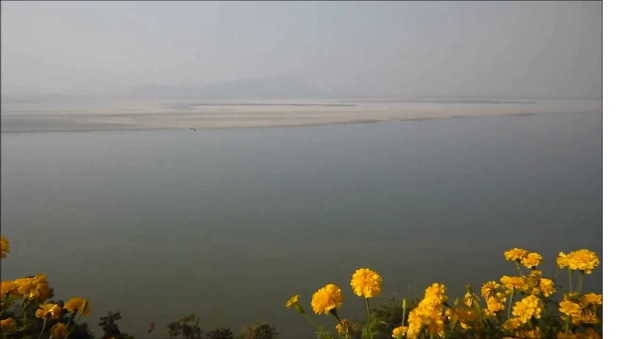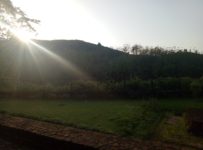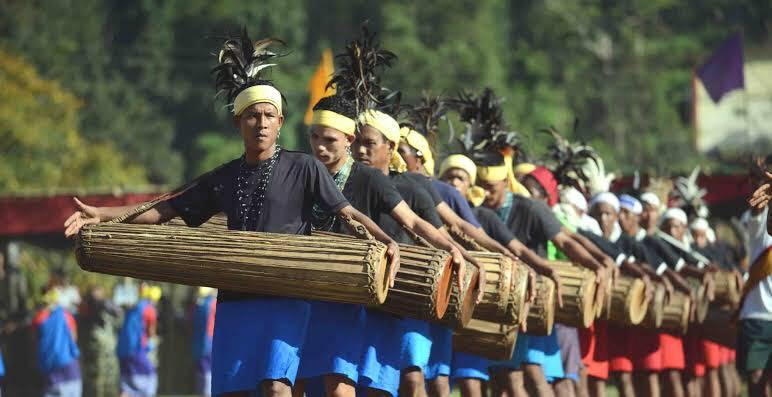
On the western side of the beautiful state of Meghalaya,in the North east of India,are the Garo hills. A hot spot of rich bio diversity, it is also a region of culture and traditional tales of myths and legends.The dominant tribe in this region are the Garo people who live across this hilly terrain,hence the name Garo hills.The Garos are indigeneous Tibeto-Burman ethnic group and the second-largest tribe in Meghalaya after the Khasis. They have a rich tradition and celebrate festivals which are mostly agriculture based. One of the most popular festivals of the Garo people is the “Wangala”or The Hundred Drums Festival.It is the festival of thanksgiving to the Sun God (Misi Saljong).Garo people are dependents of agro-economy and do not use any agricultural products before thanking the God of fertility, Misi-Saaljong. Wangala Festival signifies the beginning of winter and also marks the end of labor in fields ushering in a period of relaxation and merry making.
About the Festival:
Wangala festival of the Garo’s is usually in November,after the harvest.It is considered a taboo to take the crops from the fields without performing the Wangala. The day of the celebration is fixed by the different villages based on the time taken for collecting and harvesting their crops.There are two basic stages to the Wangala festival:
Chu-Rugala-The Pouring of rice beer, is the first stage and is done by the priest, known as “Kamal” and the Chachat Soa-Incense burning, is the second stage.At Rugala, an offering of the first-hand special rice beer, cooked rice and vegetables are offered to the Giver, Misi Saljong.

The Nokma or the village Chief performs the Chachat Soa ceremony (marked by burning of incense) at the central pillar of his house to mark the beginning of the Wangala Festival. This ceremony starts in the Nokma’s house where the sacred drum is kept. Rice is scattered all over the house symbolizing the rain and hail, the sowing season. Then incense is brunt and the smoke symbolizes the rain clouds. Throughout the ceremony drums and gongs (rang) are played. A meal is served followed by dancing in the Nokmas house which continues in the village throughout the night.

Dama Gogata, the dance with drums, flutes and assorted brass instruments by men and women in colourful dresses and proud headgear, a picture which is synonymous with visuals of Wangala – is performed on the last day of the three days-long celebration.
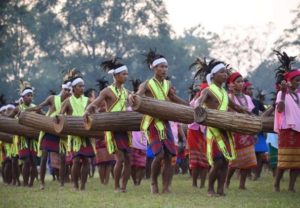
The Celebrations,a show case of culture and heritage:
Over the years the basic traditonal wangala festival began to lose its roots and thus a major cultural identity of the Garo’s was begining to get extinct. It was then that a few Garo intellectuals and with the help from the authorities, the annual Wangala festival was thought of. A group of 30 dancers with 10 drums would form a group and 10 such groups will be there. Thus a total of 100 drummers and 300 dancers make up what is now known as the “100 Drums Wangala Festival”.This 100 drums festival was first organised in 1976 at Assanang, the headquarters of Rongram Development Block. Since then the three festival has grown by leaps and bounds adding new attractions every year.
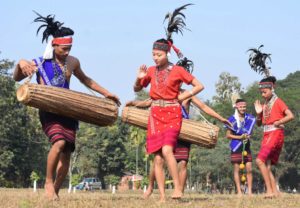
This is a festival unique to the culture of the Garos and these people from different villages come together to celebrate their tradition of thanks offered in a unique and eventful way.Various cultural competitions take place with dance playing the major part.The whole celebration takes place for 3 days at the Assanang ground, near Tura. And on the final day, 100 drums and 300 dancers dance to the beat of the 100 drums producing a spectacle to watch.
The Place of Celebrations:
The 100 Drums Wangala Festival is organized at Assanang, 18 km from Tura. Tura is the cultural and administrative centre of the Garo tribes as well as the headquarters of the West Garo Hills.
How to get there?
Tura is around 330 kms from Shillong and 220 kms from Guwahati.There are night buses from both Guwahati and Shillong as well as Sumo services. But it is closer and easier to travel from Guwahati than come via Shillong.
{Click on the image above for your travel solutions}
This year the Wangala Festival started on the 8th of November and ended on the 10th of November, 2018.There were tourists not only from across the country but also from around the world.Tradition was clearly the mantra of this three day festival and efforts were made to show case the world the rich tradition of the Garos. For those who love to know about the vibrant culture of the beautiful North East, the Wangala festival, a cultural extravaganza of the region in November each year is a must see.

